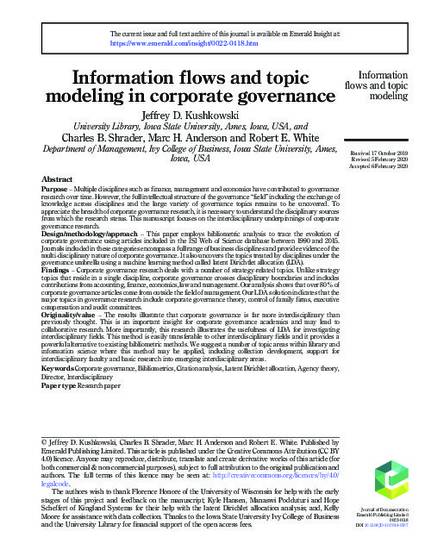
Purpose – Multiple disciplines such as finance, management and economics have contributed to governance research over time. However, the full intellectual structure of the governance “field” including the exchange of knowledge across disciplines and the large variety of governance topics remains to be uncovered. To appreciate the breadth of corporate governance research, it is necessary to understand the disciplinary sources from which the research stems. This manuscript focuses on the interdisciplinary underpinnings of corporate governance research.
Design/methodology/approach – This paper employs bibliometric analysis to trace the evolution of corporate governance using articles included in the ISI Web of Science database between 1990 and 2015. Journals included in these categories encompass a full range of business disciplines and provide evidence of the multi-disciplinary nature of corporate governance. It also uncovers the topics treated by disciplines under the governance umbrella using a machine learning method called latent Dirichtlet allocation (LDA).
Findings – Corporate governance research deals with a number of strategy-related topics. Unlike strategy topics that reside in a single discipline, corporate governance crosses disciplinary boundaries and includes contributions from accounting, finance, economics, law and management. Our analysis shows that over 80% of corporate governance articles come from outside the field of management. Our LDA solution indicates that the major topics in governance research include corporate governance theory, control of family firms, executive compensation and audit committees.
Originality/value – The results illustrate that corporate governance is far more interdisciplinary than previously thought. This is an important insight for corporate governance academics and may lead to collaborative research. More importantly, this research illustrates the usefulness of LDA for investigating interdisciplinary fields. This method is easily transferable to other interdisciplinary fields and it provides a powerful alternative to existing bibliometric methods. We suggest a number of topic areas within library and information science where this method may be applied, including collection development, support for interdisciplinary faculty and basic research into emerging interdisciplinary areas.
Available at: http://works.bepress.com/marc_anderson/5/

This article is published as Kushkowski,J.D., Shrader, C.B., Anderson, M.H., White, R.E., Information flows and topic modeling in corporate governance. Journal of Documentation, June 19, 2020; Doi: doi: 10.1108/JD-10-2019-0207.